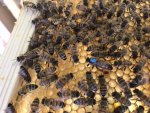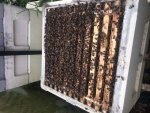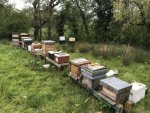I tell you what, reading you guys discussing your beekeeping activities nearly, nearly - makes me want to have another go 
But, not quite!
But, not quite!
not sure. Couldn't see which one they'd come from if from ours but seemed a bit too much of a coincidence if not from ours.Was it from you own hives or from somewhere else? The June gap seems to be over around here so hives are filling up again so I expect swarms are more likely that a few weeks ago.
I've only heard of Africanized bees in North America, not here.Question - 'African' Bees, are they prevalent in the UK or not??
How does one ID them?
I've only heard of Africanized bees in North America, not here.
Question - 'African' Bees, are they prevalent in the UK or not??
How does one ID them?
I don't know much about them but a bit of a google shows you're not likely to be able to tell the difference easily. ( http://entnemdept.ufl.edu/creatures/misc/bees/ahb.htm). The simplest ID is their willingness to defend their nest.
Although not along the same lines it should be noted that some strains of honey bees in the UK can be very defensive. I've met one keeper who had a hive that would readily attack people 50m away from the hive. Keepers tend to breed for better behaved bees so most colonies will (should) be far more gentle.
Sounds like an aggressive colony, were they in someone's hives or a wild colony? I gather tree bumble bees can be aggressive but not heard of them following people.
Honey bees can also be variable. If they become queenless for example they may be more agressive (I've not noticed this). Bad weather, vibrations from machinery etc can all affect their temperament. They also don't like dark clothing but that's probably only of concern if you're actually inspecting a colony.



Good evening all. I have only just spotted that we have a beekeeping thread on BCUK! I clearly need to spend more time here.
do you run on single or double brood on your honey producing hives? Our local bee farmer runs on single brood and claimed they would produce less honey on a double.

Why do others keep aggressive hives then ?
With a hundred hives I doubt you have much time to spend!
Are you rasing the new Queens and colonies yourself or buying in? I'm also curious, do you run on single or double brood on your honey producing hives? Our local bee farmer runs on single brood and claimed they would produce less honey on a double.
